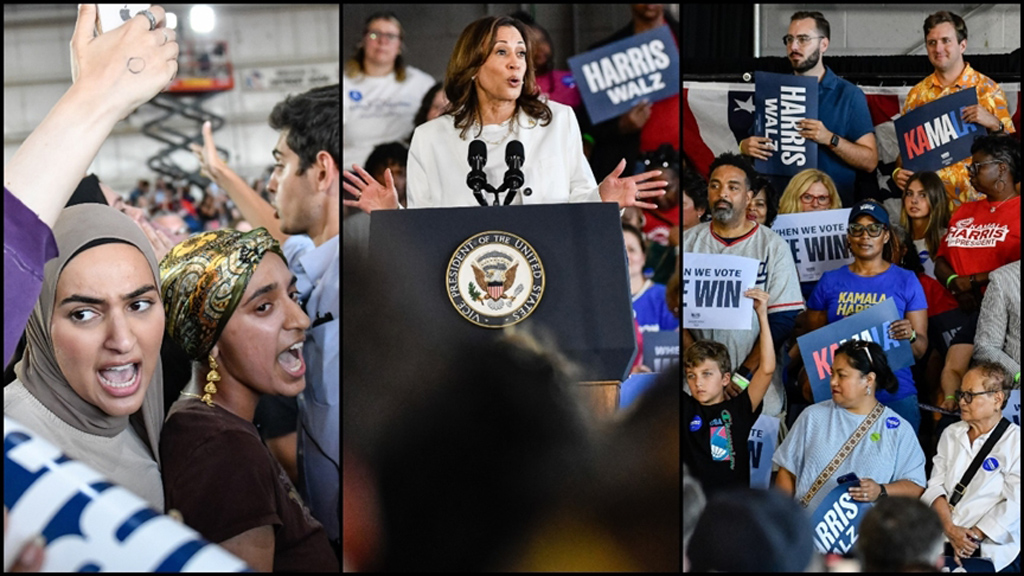Kamala Harris’s response to the Palestinian protests at a rally in Detroit last week highlighted the challenges she faces in uniting the Democratic Party behind her. Prior to her speech at the rally, Harris met with protesters who were demanding that the flow of arms to Israel be halted based on human rights conditions. She reacted angrily when the group interrupted her speech, saying, “If you want Trump to win, say so; otherwise, I’m speaking now.” After receiving backlash, Harris tried to mend relations in a later rally by stating her respect for different voices. Her attempt to differentiate herself from Biden on the Palestinian issue might be overshadowed by these dissenting Democratic voters' protests at the party convention.
UNCOMMITTED VOTERS
For Harris, who will officially declare her candidacy at the Democratic Party Convention in Chicago next week, securing the support of all 4,600 delegates would be a major show of strength. However, 30 of these delegates represent about 700,000 Democratic voters who expressed protest votes against Biden in the primaries. The surge in support among young and Black voters appears to be reflected in the polls, but expectations remain high for Harris on the Palestinian issue. Efforts are being made to include a speaker representing the uncommitted delegates at the convention, particularly one representing Israeli hostage families.
In Michigan, where Detroit is located, Muslim and Arab voters cast around 100,000 uncommitted votes against Biden in the Democratic primaries. Similar reactions in other states have turned uncommitted voters into a crucial group within the party. This group’s protests at Biden’s events have had a significant psychological impact. Gaining or at least avoiding a strong backlash from this group will be important for Harris. While it is debated whether the uncommitted voters in Michigan could cost the Democrats the election, Harris needs full mobilization in swing states.
THE 'TRUMP WOULD BE WORSE FOR PALESTINE' ARGUMENT
Harris’s frustrated response in Detroit, implying that a Trump alternative would be much worse for Palestine, has become a significant argument used by Democrats. Trump had promised beyond full support for Israel, stating he would deport those protesting in the U.S. in favor of Palestine. He even threatened prosecution against protesters, suggesting they were not American citizens. In contrast, Harris, as part of the Biden administration, has emphasized the worsening humanitarian situation in Palestine during meetings with Netanyahu, which is seen as important but insufficient by critics.
For voters concerned about Palestine, Trump’s threats carry little weight, as the genocide occurred under the Biden administration. It is clear that Washington did not exert the necessary pressure to stop Israel’s operations with the weapons provided by the U.S. Protesters are demanding that Harris make certain commitments on this issue. The media has repeatedly highlighted that arms sent to Israel are not vetted through human rights filters. Biden had briefly suspended the flow of ammunition after declaring that Israeli incursions into Rafah would be a red line, but large-scale arms transfers continued, influenced by rising tensions and potential conflicts with Iran.
Harris’s suggestion that Trump would be worse does not sufficiently demonstrate how she would differ from Biden. The statements of Harris’s national security and foreign policy advisor, Phil Gordon, offer significant insights. Gordon stated that Harris would always support Israel’s self-defense against Iran and its proxies, would not support an arms embargo on Israel, and would work to protect civilians in Gaza. Many of Gordon’s statements, which reflect expected policy under a potential Harris administration, do not show a significant departure from Biden’s current policies. Without further indications of policy changes or a stronger focus on human rights, the strategy of scaring uncommitted voters with Trump’s stance remains ineffective.
So far, Harris and her close associates’ statements have not signaled a serious policy shift on Palestine, only showing a slightly more sensitive rhetoric on human rights. The upcoming convention in Chicago presents a significant opportunity for Harris to attract the uncommitted voters, but it also poses a risk. Including a speaker for the uncommitted could diminish the impact of protests and signal a willingness to act differently from Biden and Trump on Palestine. If Harris is willing to face criticisms from Republicans about disregarding Israeli security, she might achieve a strong show of support from all Democratic factions. Otherwise, despite the momentum she has gained, she risks being remembered as a politician who did not act boldly on critical issues like Palestine.







